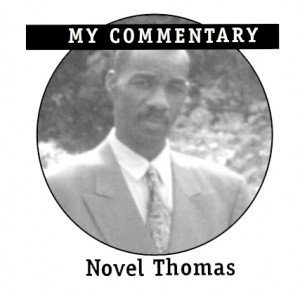 Call it what you will, “me too” will call it what it is: cultural appropriation.
Call it what you will, “me too” will call it what it is: cultural appropriation.
When I turned on the radio early one morning the beginning of last week and heard about a gathering at a downtown venue where people were protesting the staging of a special musical performance as part of this year’s Jazz Festival, the thought that immediately came to mind was “Oh boy, here we go again…”
It was almost natural. Over the years I’ve heard of so many instances of [Black] cultural appropriation in its various forms. All to tacitly illustrate and/or demonstrate that in both ironic and paradoxical ways Black people (still) have value. Just look, think… and you’ll see.
One online article describes the performance this way, “SLAV: A theatrical odyssey based on slave songs… the show is described by the theatre as a journey “through traditional Afro-American songs, from cotton fields to construction sites, railroads, from slave songs to prison songs.”
If, say, Black Theater Workshop were involved in that performance of slave songs (and they should’ve been), it would’ve… might’ve been promoted as a lament ‘highlighting’ the plight of Black people in America – then and now – especially Black males.
[Try and see a two-hour documentary, #American Jail, televised on CNN Canada Day weekend. It’s captivating and very revealing.]
Here we are, trying to retain some semblance of what’s left of our collective post-slavery being, existence and dignity, and white people are still finding ways to mine… to capitalize off [whatever’s left of] us.
In the passionate discussions that ensued on various radio talk shows the better part of the week, the term “tone deaf” was liberally used by many (‘in solidarity’) callers who considered the musical performance of “Black slave songs” as nothing short of a financial endeavour coated in historic songs (for public consumption), not anything related to a peoples’ genuine historical story – notwithstanding the specious explanations provided by the producer of “the performance.”
The more I heard about that ‘musical performance’ the more I began to think of the notion of ‘black face’. (A few years ago Quebecers in the entertainment industry had a propensity for doing New Year’s Eve minstrelsy black face skits) until an outcry in the Black community forced them to find other innocuous and inoffensive forms of entertainment for their audience.
In other words, SLAV was just another way for a local impresario to use an episodic, but important extended historical event, which still impacts tens of millions of people, to make some money. After all, we’re still perceived as slim pickings…
Generating ‘mild’ controversy and discussion, as well as drawing crowds to view “the performances”, were his primary motivation. People engaging in substantive discussions and critiquing… likely were the farthest from his mind. So given our still tenuous place and social status, he thought the whole thing – white people singing slave songs – would go over without public outcry.
Said one of the protestors at the venue that day SLAV: A theatrical odyssey was being staged, “I don’t believe the descendents of the people who wrote these songs are going to see this show… It’s something we see a lot in the entertainment industry — the taking of these stories of Black pain and stories of slavery by white people in order to make a profit. That’s what we are against.”
That sentiment echoed the voices and thoughts of thousands of Montrealers of all stripes.
But “Black people,” as we all know, “are not a monolith.”
One Black woman on a call-in show said, “We (Black people) don’t have a monopoly on struggle…”
In attempting to mitigate public criticism, the producer/impresario offered an explanation, something along the lines of “cultural awareness.” Explaining in an interview, “[…] let the audience decide.”
“Cultural appropriation.” SLAV, without the ‘E’ evokes memories of how another Black musical creation, Jazz’, was inevitably appropriated… co-opted by another local impresario, Doudou Boicel. He wasn’t blessed with pure laine and other traits, couldn’t access political and financial support.
Nevertheless, he put Jazz on the Montreal map with his internationally-renowned Rising Sun Blues-Jazz club, which was located at Ste. Catherine and Jeanne-Mance Streets, the entrance to the now annual, financially-lucrative Montreal International Jazz Festival.
From what I’ve heard over the years, after all sorts of, let’s say political and other shenanigans, Doudou and his Rising Sun club ultimately set. Today, (for those who do not know one of the people who put Jazz on the musical map in Montreal) he’s not even a literary reference when people talk about Jazz in Montreal.
Boy, oh boy. “A show directed by a white man, featuring a white woman singing songs composed by Black slaves.”
It’s the optics of that “SLAV… odyssey” that disturbed so many people.
Co-opting, appropriating… But [some] white people just don’t get it. Or don’t care to.
Maybe that’s why the Odyssey had a short life span.















